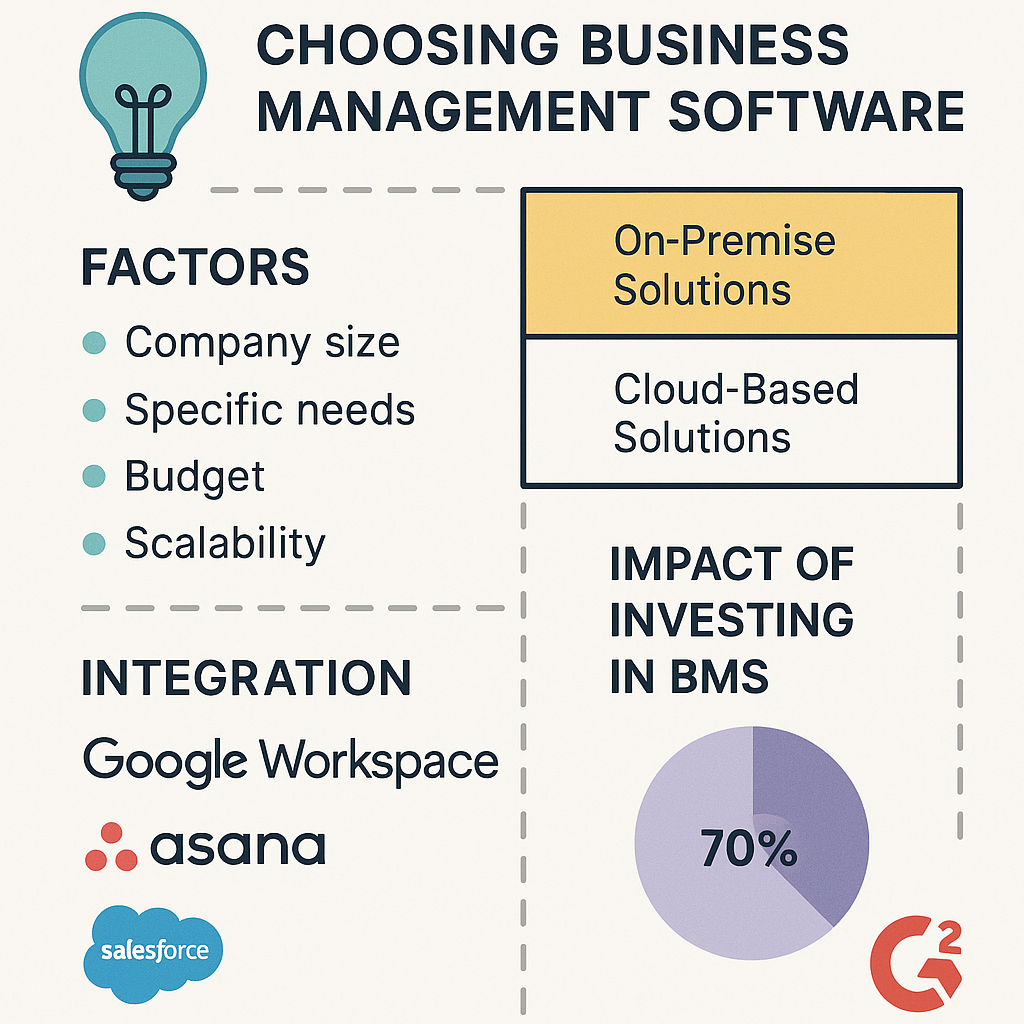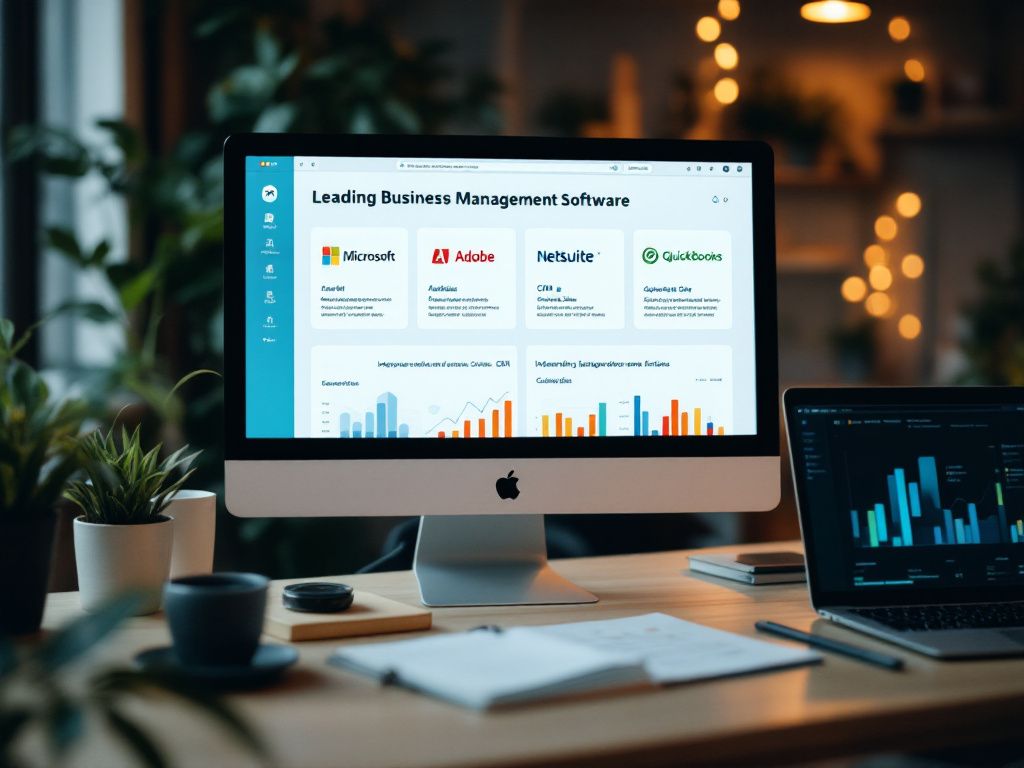
Business management software has become essential for modern companies seeking to streamline operations and boost productivity. These comprehensive platforms integrate sales, marketing, HR, and analytics functions into unified systems. Understanding how to select and implement the right management software can transform business efficiency and drive sustainable growth.
Good to know
Companies using integrated business management software typically see a 20-30% increase in operational efficiency within the first year of implementation, according to industry research on enterprise software adoption.
Understanding business management software
Business management software represents a comprehensive digital solution designed to streamline and automate core business processes across multiple departments. BMS serves as the operational backbone for organizations, enabling them to manage daily activities while enhancing overall productivity and efficiency.
Core Components of Business Management Software
Modern business management software encompasses various integrated modules that address different organizational needs. Sales management tools track leads, manage customer relationships, and monitor revenue pipelines. Some platforms also include sales compensation software to automate commission calculations, align incentive plans with performance goals, and provide greater transparency for sales teams. Marketing modules facilitate campaign management, customer segmentation, and performance analytics. Human resources components handle employee records, payroll processing, and performance evaluations, while analytics modules provide real-time insights into business performance metrics.
These interconnected modules eliminate data silos by allowing seamless information flow between departments. When sales teams update customer information, marketing departments instantly access this data for targeted campaigns, while analytics tools generate comprehensive reports across all business functions.
Comprehensive Software Solutions in Practice
Zoho exemplifies the versatility of modern BMS with its suite of 45+ unified applications covering everything from customer relationship management to financial planning. This comprehensive approach enables businesses to manage operations from a single platform rather than juggling multiple disconnected tools.
Similarly, Striven offers an all-in-one business management suite that connects accounting, project management, and customer service functions. These platforms demonstrate how integrated software solutions can eliminate redundant data entry, reduce operational costs, and improve decision-making through centralized information access.
Integration Benefits for Business Operations
The seamless integration of various business functions through unified software platforms creates significant operational advantages. Teams can access shared data repositories, automate routine tasks, and maintain consistent workflows across departments, ultimately driving improved business performance and customer satisfaction.

Choosing the right software for your business
Selecting the appropriate business management software requires a strategic approach that aligns with your organization’s unique requirements and growth trajectory. The decision-making process involves evaluating multiple factors to ensure optimal return on investment and operational efficiency.
Key Selection Criteria for Business Management Software
Company size serves as a fundamental determinant when choosing management tools. Small businesses typically benefit from cloud-based solutions like Asana or basic CRM systems, while enterprise-level organizations often require comprehensive platforms such as Salesforce with advanced customization capabilities. Budget considerations play an equally critical role, as software costs can range from $10 per user monthly for basic tools to thousands of dollars for enterprise solutions.
Scalability represents another crucial factor, ensuring your chosen software can accommodate business growth without requiring complete system overhauls. According to G2 user reviews, 73% of businesses that invested in scalable management software reported improved operational efficiency within six months of implementation.
Cloud vs. On-Premise Solutions
Cloud-based management software offers significant advantages for modern businesses, including reduced infrastructure costs, automatic updates, and enhanced accessibility. Google Workspace exemplifies this approach, providing seamless collaboration tools that integrate effortlessly with other business applications. On-premise solutions, while offering greater control over data security, require substantial IT resources and higher upfront investments.
Integration Capabilities and Platform Compatibility
Successful software implementation depends heavily on integration capabilities with existing tools. The best management platforms offer native connections with popular applications, creating a unified ecosystem that eliminates data silos. Organizations utilizing integrated solutions report 40% faster project completion times and improved team collaboration across departments, according to industry research data.

Exploring top business management software options
The business management software market presents numerous compelling options, each designed to address specific operational challenges while providing comprehensive solutions for modern enterprises. Understanding the distinctive features and capabilities of leading platforms enables organizations to make informed decisions that align with their strategic objectives.
Microsoft’s Comprehensive Business Ecosystem
Microsoft’s business management suite stands out through its robust CRM capabilities integrated within Microsoft Dynamics 365. The platform excels in customer relationship management by providing advanced lead tracking, sales pipeline visualization, and customer service automation. Its seamless integration with Gmail and Google Docs ensures cross-platform compatibility, while native connectivity with Microsoft Office applications creates a unified workflow environment. Organizations report significant improvements in sales conversion rates, with one mid-sized manufacturing company experiencing a 35% increase in lead-to-customer conversion after implementing Microsoft’s CRM modules.
Adobe’s Creative-Focused Management Solutions
Adobe’s business management offerings prioritize creative workflows and digital asset management. The platform integrates sophisticated project management tools with creative collaboration features, enabling design teams to streamline their processes from concept to delivery. Integration with Dropbox facilitates seamless file sharing and version control, while advanced analytics provide insights into creative productivity metrics.
NetSuite’s Enterprise Resource Planning Excellence
NetSuite delivers comprehensive ERP functionality through cloud-based architecture, encompassing financial management, inventory control, and e-commerce capabilities. The platform’s strength lies in its scalability and real-time reporting features, making it particularly effective for growing businesses requiring sophisticated operational oversight.
QuickBooks’ Specialized Accounting Focus
QuickBooks maintains its position as the leading small business accounting solution through user-friendly interfaces and comprehensive financial management tools. Its accounting modules include automated invoicing, expense tracking, and tax preparation features, while integrations with banking institutions streamline financial reconciliation processes.

The future of business management software and technology integration
The landscape of business management software is rapidly evolving, driven by groundbreaking technological advancements that promise to revolutionize how organizations operate. As we move forward, artificial intelligence and machine learning are becoming the cornerstone of next-generation business platforms, transforming traditional workflows into intelligent, self-optimizing systems.
Artificial Intelligence and Machine Learning Revolution
The integration of AI and machine learning into business management software is creating unprecedented opportunities for operational efficiency. Modern platforms are developing sophisticated predictive analytics capabilities that can forecast market trends, customer behavior, and resource requirements with remarkable accuracy. These systems analyze vast datasets to identify patterns and provide actionable insights, enabling businesses to make data-driven decisions proactively rather than reactively.
AI assistants like Zia from Zoho exemplify this transformation, offering intelligent sales forecasting and automated decision-making support. These virtual assistants can process complex business data, generate reports, and even suggest strategic adjustments based on real-time market conditions. The technology enables businesses to anticipate challenges and capitalize on opportunities before competitors recognize them.
Advanced Automation and Security Enhancements
Automated workflows are becoming increasingly sophisticated, incorporating machine learning algorithms that adapt and improve over time. These systems can handle complex multi-step processes, from customer onboarding to supply chain management, with minimal human intervention. The automation extends beyond simple task execution to include intelligent routing, exception handling, and quality assurance protocols.
Enhanced data security remains paramount as businesses digitize their operations. Future business management software will incorporate advanced encryption, biometric authentication, and AI-powered threat detection systems to protect sensitive information against evolving cyber threats.
Emerging Technologies: Blockchain and IoT Integration
The convergence of blockchain technology and Internet of Things (IoT) devices is creating new possibilities for business optimization. Blockchain provides immutable transaction records and smart contract capabilities, while IoT sensors deliver real-time operational data. This integration enables unprecedented transparency in supply chains, automated compliance reporting, and predictive maintenance schedules that minimize downtime and reduce operational costs.

What to remember about business management software
Business management software represents a fundamental shift toward integrated, intelligent business operations. As AI and machine learning continue to evolve, these platforms will become even more sophisticated, offering predictive analytics and automated workflows. Companies investing in the right management software today position themselves for future success, with enhanced data security, improved decision-making capabilities, and streamlined processes that adapt to changing business needs.